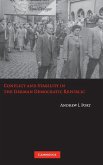An analysis of the origins and impact of generation conflict in modern German history, from the eighteenth century to the 1960s student revolts.
This is the first English-language collection of essays on modern German history with a generational theme. It adresses, first, the extraordinary power and persistence of a German tradition of youthful rebellion extending from the Sturm und Drang in the eighteenth century to the student revolts of 1968 and, second, the impact of the dramatic ruptures and discontinuities in modern German history on the formation and interaction of successive historical cohorts. Using a variety of different approaches, including literacy and oral history, the collection pays particular attention to the way generational identities interacted with those of class and gender. The book adds to our understanding of generations, of the balance between continuity and discontinuity in modern German history, of the generational roots of National Socialism and the Hitler Youth generation's impact on East and West German society.
Table of content:
1. Introduction: Generation conflict and German history 1770-1968 Mark Roseman; 2. The ideal of youth in late 18th-century Germany Joachim Whaley; 3. Young Germans and Young Germany: some remarks on the history of German youth in the late 18th and in the first half of the 19th century Rainer Elkar; 4. The battle for the young: mobilising young people in Wilhelmine Germany Jürgen Reulecke; 5. Jewish politics and generation conflict in Wilhelmine Germany Jacob Borut; 6. The 'Front Generation' and the politics of Weimar Germany Richard Bessel; 7. The 'New Woman' and generation conflict: perceptions of young women's sexual mores in the Weimar Republic Cornelie Usborne; 8. Generations of German historians: patronage, censorship and the containment of generation conflict, 1918-1945 Peter Lambert; 9. Gender, generation and politics: young protestant women in the final years of the Weimar Republic Elizabeth Harvey; 10. The Hitler Youth generation and its role in the two post-war German states Alexander von Plato; 11. The BDM generation: a female generation in transition from dictatorship to democracy Dagmar Reese; 12. A generation twice betrayed: youth policy in the transition from the Third Reich to the Soviet Zone of Occupation 1945-1946 Michael Buddrus; 13. The generation that never was: young labour in the Ruhr mining industry 1945-1957 Mark Roseman; 14. The German Kriegskinder. Origins and impact of the generation of 1968 Heinz Bude.
This is the first English-language collection of essays on modern German history with a generational theme. It adresses, first, the extraordinary power and persistence of a German tradition of youthful rebellion extending from the Sturm und Drang in the eighteenth century to the student revolts of 1968 and, second, the impact of the dramatic ruptures and discontinuities in modern German history on the formation and interaction of successive historical cohorts. Using a variety of different approaches, including literacy and oral history, the collection pays particular attention to the way generational identities interacted with those of class and gender. The book adds to our understanding of generations, of the balance between continuity and discontinuity in modern German history, of the generational roots of National Socialism and the Hitler Youth generation's impact on East and West German society.
Table of content:
1. Introduction: Generation conflict and German history 1770-1968 Mark Roseman; 2. The ideal of youth in late 18th-century Germany Joachim Whaley; 3. Young Germans and Young Germany: some remarks on the history of German youth in the late 18th and in the first half of the 19th century Rainer Elkar; 4. The battle for the young: mobilising young people in Wilhelmine Germany Jürgen Reulecke; 5. Jewish politics and generation conflict in Wilhelmine Germany Jacob Borut; 6. The 'Front Generation' and the politics of Weimar Germany Richard Bessel; 7. The 'New Woman' and generation conflict: perceptions of young women's sexual mores in the Weimar Republic Cornelie Usborne; 8. Generations of German historians: patronage, censorship and the containment of generation conflict, 1918-1945 Peter Lambert; 9. Gender, generation and politics: young protestant women in the final years of the Weimar Republic Elizabeth Harvey; 10. The Hitler Youth generation and its role in the two post-war German states Alexander von Plato; 11. The BDM generation: a female generation in transition from dictatorship to democracy Dagmar Reese; 12. A generation twice betrayed: youth policy in the transition from the Third Reich to the Soviet Zone of Occupation 1945-1946 Michael Buddrus; 13. The generation that never was: young labour in the Ruhr mining industry 1945-1957 Mark Roseman; 14. The German Kriegskinder. Origins and impact of the generation of 1968 Heinz Bude.








